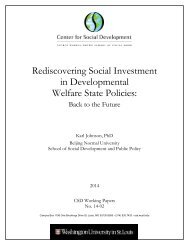Exploring and Assessing Intercultural Competence - Center for ...
Exploring and Assessing Intercultural Competence - Center for ...
Exploring and Assessing Intercultural Competence - Center for ...
Create successful ePaper yourself
Turn your PDF publications into a flip-book with our unique Google optimized e-Paper software.
<strong>Exploring</strong> <strong>and</strong> <strong>Assessing</strong> <strong>Intercultural</strong> <strong>Competence</strong><br />
Assertion No. 8<br />
Some returnees lean toward specific life choices, life partners, life styles, values <strong>and</strong> jobs as<br />
a result of this experience<br />
Discussion<br />
Evidence <strong>for</strong> this assertion is somewhat limited at the moment. This may be attributable to the<br />
fact that, except <strong>for</strong> one, alumni were all young adults (between the ages of 19-28) <strong>and</strong> have yet<br />
to make such choices. The sole exception, an elderly woman of 63, obviously already made these<br />
choices <strong>and</strong> would be unlikely to change at this point. Nonetheless, numerous indicators suggest<br />
that the alumni were (re)oriented as a result of their experience.<br />
All but two returned to their previous home situations. One British alumna remained in Ecuador<br />
because she enjoyed the experience so much <strong>and</strong> is currently employed at the Embassy in Quito<br />
as is one Swiss volunteer. Of the returnees, one Swiss alumna stated that she was pursuing<br />
courses related to her recent experience, while many others were pursuing further language study<br />
(Spanish or another language). Still others were pursuing related fields of study, <strong>and</strong> several were<br />
contemplating intercultural careers. One returnee said she had chosen her career path be<strong>for</strong>e<br />
Ecuador but that the experience confirmed her choice <strong>and</strong> made her more excited <strong>and</strong> prepared<br />
<strong>for</strong> her chosen field in environmental studies.<br />
Other indicators were expressed through comments made in open-ended sections of the survey<br />
<strong>for</strong>m <strong>and</strong> in the interviews that followed:<br />
The British volunteers:<br />
(B1)<br />
- retained language ability <strong>and</strong> plan to revisit Ecuador<br />
- rein<strong>for</strong>ced decision to pursue a career in the environmental section (as per my project in<br />
Ecuador)<br />
(B3)<br />
- mentoring, coaching 7 English people <strong>and</strong> 1 person each from France <strong>and</strong> Germany at<br />
work<br />
- often encounter people at his/her firm from other countries <strong>and</strong> goes out of his/her way<br />
to welcome them using their own language<br />
- would like to take a career break so I could volunteer again<br />
- his/her company offered him/her the chance to travel to another country<br />
- wants to work in South America<br />
(B5)<br />
- psychologist <strong>for</strong> offending behavior programs, working with about 10 persons per<br />
group<br />
(B8)<br />
- gave direction to career <strong>and</strong> life<br />
- went traveling throughout Latin America on own<br />
- began teaching English, gave private lessons, worked <strong>for</strong> a filming company<br />
- also worked as journalist <strong>and</strong> editor <strong>for</strong> a tourism website<br />
- then worked as assistant in Embassy<br />
<strong>Center</strong> <strong>for</strong> Social Development<br />
Washington University in St. Louis<br />
46
















